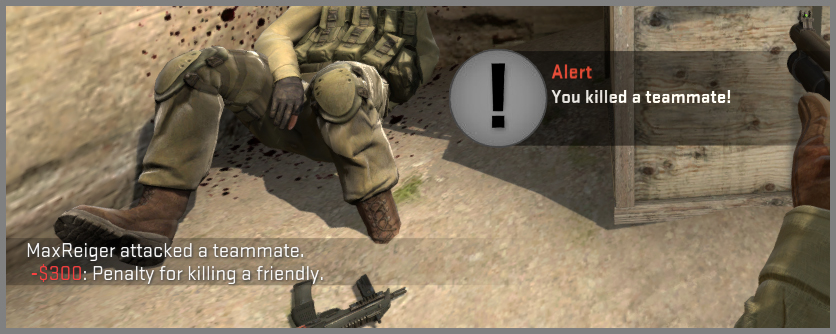Elevate Your Digital Presence
Explore tips and strategies to enhance your online engagement.
Friendly Fire: Why Teamkill Penalties are the Real Game Changer in CSGO
Discover how teamkill penalties redefine strategies in CSGO and impact gameplay. Uncover the surprising effects of friendly fire!
Understanding the Impact of Teamkill Penalties on Team Dynamics in CSGO
In the competitive world of CSGO, understanding the impact of teamkill penalties on team dynamics is essential for fostering a positive gameplay environment. Teamkill penalties serve not only as a deterrent for accidental or intentional friendly fire but also as a mechanism to reinforce teamwork and accountability among players. When players are aware that their actions can have direct consequences on their team's performance and morale, they are likely to be more cautious and focused on their roles within the game.
Moreover, the implementation of these penalties can influence team communication and strategy. Teams may develop a stronger emphasis on collaboration and careful positioning to mitigate any risks associated with inadvertently harming a teammate. As teams adapt to these challenges, they often engage in deeper discussions regarding positioning, awareness, and tactics, ultimately enhancing their overall synergy. It becomes clear that teamkill penalties not only act as a punitive measure but can also cultivate a more cohesive team dynamic in CSGO.

Counter-Strike is a popular multiplayer first-person shooter game series that pits teams of terrorists against counter-terrorists in various scenarios. Players can customize their characters with different weapon skins, including the cs2 zeus skins, adding a personal touch to their gaming experience. The game focuses on teamwork, strategy, and quick reflexes, making it a favorite among competitive gamers worldwide.
Are Teamkill Penalties Effective in Reducing Friendly Fire Incidents?
The implementation of teamkill penalties in multiplayer gaming has sparked extensive debate regarding their effectiveness in reducing friendly fire incidents. Many players argue that these penalties, which can range from point deductions to temporary bans, serve as a deterrent for reckless behavior in-game. The underlying premise is that when players face tangible consequences for harming teammates, they become more cautious in their actions. Research suggests that some games have seen a marked decrease in teamkills after such penalties were introduced, pointing to a correlation between punitive measures and improved player behavior.
However, the effectiveness of teamkill penalties may vary significantly depending on the gaming environment and community culture. For instance, in highly competitive settings, players may be more inclined to adapt their gameplay to avoid penalties, thus reducing incidents of friendly fire. Conversely, in more casual gaming scenarios, players might not perceive the penalties as a strong enough deterrent. Ultimately, the success of teamkill penalties hinges on player accountability and the severity of consequences, which necessitates a balanced approach to maintain an enjoyable gameplay experience without fostering hostility.
The Psychology Behind Teamkill Penalties: How They Change Player Behavior in CSGO
The phenomenon of teamkill penalties in Counter-Strike: Global Offensive (CSGO) serves not only as a punitive measure but also as a psychological tool to influence player conduct. When players face penalties for eliminating teammates, it introduces a heightened sense of accountability and self-regulation. This can lead to more cautious behavior, as players become acutely aware of their potential impact on the game. The fear of losing points or experiencing matchmaking delays often acts as a deterrent, prompting players to execute strategies with better communication and teamwork.
Moreover, the effect of teamkill penalties extends beyond individual accountability; it fosters a culture of mutual respect and collaboration within teams. Players are more likely to adopt a cooperative mindset, anticipating the consequences of their actions on their teammates. This influence can create a ripple effect, where one player's disciplined behavior, driven by the fear of punishment, encourages others to follow suit. Consequently, teamkill penalties play a vital role in reshaping the mentality of players, steering them towards a more constructive and team-oriented approach in their gaming experience.